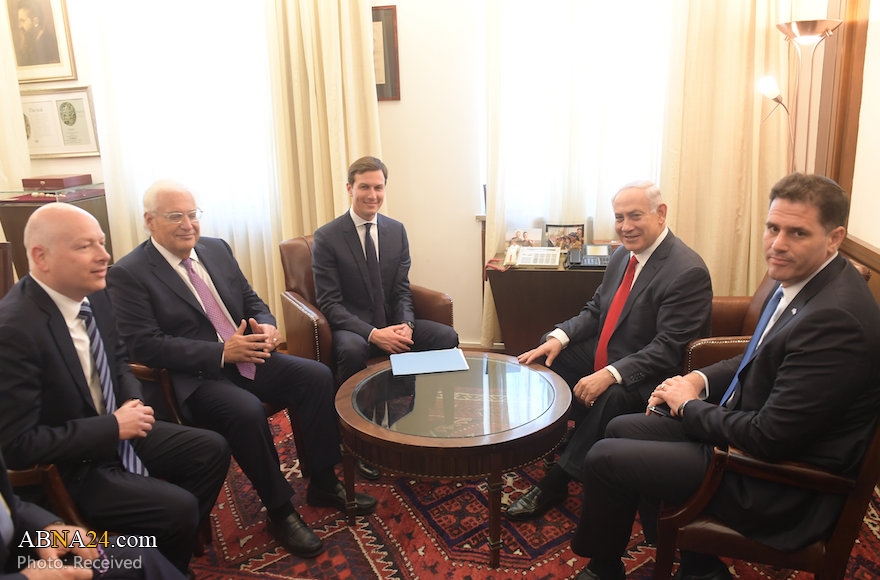(AhlulBayt News Agency) - US President Donald Trump’s point men on the so-called Israeli-Palestinian peace process, special adviser Jared Kushner and Middle East envoy Jason Greenblatt met with the King of Jordan on Tuesday to kick off their tour in the region intended to focus on advancing so-called peace in the Israeli-Palestinian conflict.
“Building on previous conversations, they discussed increasing cooperation between the United States and Jordan, regional issues, the humanitarian situation in Gaza, and the Trump Administration’s efforts to facilitate [so-called] peace between the Israelis and Palestinians,” the White House statement said following their meeting in Amman.
Greenblatt and Kushner have confirmed that their visit to Israel will take place on Friday June 22 and Saturday June 23, but their visits to Arab allies were less fleshed out, recently adding Jordan and Qatar to the original list that included Egypt and Saudi Arabia.
Kushner will return to Israel just one month after attending highly controversial American embassy move from Tel Aviv to Al-Quds Jerusalem, following Trump's decision in December to recognize the city as Zionist regime's capital.
The US envoys’ meeting comes just one day after King Abdullah II met with Netanyahu to discuss similar matters in an unannounced trip to Amman, which the Israeli premiere last visited in 2014.
Palestinian Authority spokesman Nabil Abu Rudeineh said on Saturday that the so-called peace plan, which has been promoted by the US is "meaningless" as it lacks the support of Palestinians.
The Palestinian Authority says any plan that does not recognize East Jerusalem al-Quds as the Palestinian capital or address the problem of refugees will be unsuccessful.
The US-Palestine ties deteriorated last December, when Washington recognized Jerusalem al-Quds as the “capital” of Israel and announced plans to transfer the embassy from Tel Aviv to Jerusalem al-Quds.
The contentious move led President Mahmoud Abbas to formally declare that Palestinians would no longer accept the US as a mediator to resolve the conflict because Washington was “completely biased” towards Tel Aviv.
The US embassy relocation took place on May 14, the eve of the 70th anniversary of the Nakba Day (the Day of Catastrophe), sparking deadly clashes in Gaza.
Israel lays claim to the whole Jerusalem al-Quds, but the international community views the city’s eastern sector as an occupied territory and Palestinians consider it as the capital of their future state.
The last round of Israeli-Palestinian talks collapsed in 2014. Among the major sticking points in those negotiations was Israel's continued settlement expansion on Palestinian territories.
Palestinian Authority spokesman Nabil Abu Rudeineh said on Saturday that the so-called peace plan, which has been promoted by the US is "meaningless" as it lacks the support of Palestinians.
The Palestinian Authority says any plan that does not recognize East Jerusalem al-Quds as the Palestinian capital or address the problem of refugees will be unsuccessful.
The US-Palestine ties deteriorated last December, when Washington recognized Jerusalem al-Quds as the “capital” of Israel and announced plans to transfer the embassy from Tel Aviv to Jerusalem al-Quds.
The contentious move led President Mahmoud Abbas to formally declare that Palestinians would no longer accept the US as a mediator to resolve the conflict because Washington was “completely biased” towards Tel Aviv.
The US embassy relocation took place on May 14, the eve of the 70th anniversary of the Nakba Day (the Day of Catastrophe), sparking deadly clashes in Gaza.
Israel lays claim to the whole Jerusalem al-Quds, but the international community views the city’s eastern sector as an occupied territory and Palestinians consider it as the capital of their future state.
The last round of Israeli-Palestinian talks collapsed in 2014. Among the major sticking points in those negotiations was Israel's continued settlement expansion on Palestinian territories.

